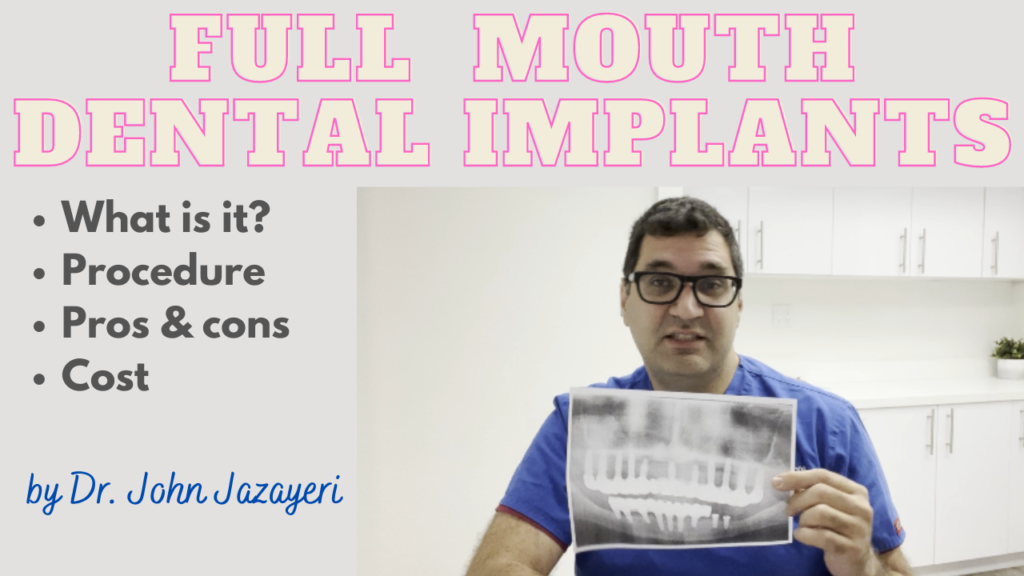Dental implants have come a long way over the past few decades. Originally, you could replace one or two missing teeth using dental implants. Fast forward a few decades, and you can replace all of your missing teeth with dental implants. This process is known as full mouth dental implants. Full mouth dental implants offer the closest option to having all of your missing teeth back. You will receive a full set of permanent teeth that are fixed in your mouth. These teeth offer excellent aesthetics, full chewing capability, and the confidence that comes with having a gorgeous, beautiful, permanent set of teeth in your mouth. This is the perfect solution for those individuals who have lost all of their teeth. The sooner you start your treatment, the more years you have to enjoy your beautiful new teeth!
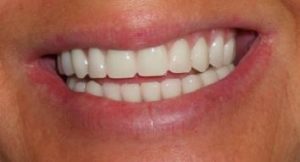
You can replace all of your missing teeth using full mouth dental implants
What is the process for full mouth dental implant treatment?
Full mouth dental implants is a very complicated, extensive, and super expensive treatment. There are plenty of surgeries involved in full mouth dental implants. Cost-wise, you're looking at the equivalent of purchasing a mid-level luxury car. Due to its complexity, only a small percentage of dentists offer this treatment. Expect to be working with either a group of dental specialists or a very experienced implant specialitt. The process usually starts off with building and restoring your missing jawbone. Next, you receive a series of dental implant posts. The final phase involves restoring these implants with porcelain or zirconia crowns and bridges. Full mouth dental implant treatment usually takes at least one year to complete. It's not unheard of for treatment to take two, three, or more years for the more complex cases. Here is a closer look at the steps involved in full mouth dental implant restoration:
Restoring Your Missing Jawbone
Full mouth dental implants require the placement of numerous dental implants throughout the jawbone. The first step is to make sure that you have enough jawbone to support these implant posts. Most toothless patients, especially those who have been missing their teeth for a long time, won't have enough bone to support so many implants. As a result, most full mouth implant treatments typically start off by building up the missing jawbone. This typically requires extensive bone grafting, especially in the back of the jaws where the molar teeth used to be located. You may end up requiring procedures such as a lateral wall sinus graft or autogenous block graft to restore the missing bone:
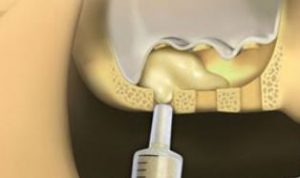
A lateral wall sinus graft may be used to buildup the jawbones in the upper back region
- Lateral wall sinus graft - This surgery involves lifting your sinuses and adding a substantial amount of bone to the upper posterior region to place implants there.
- Block bone graft - This a procedure where your dentist or oral surgeon takes bone from a donor site, like your chin, hips, ribs, etc. and attaches the bone to your jaws using screws.
These are complex grafting procedures. They are very difficult, painful, and expensive procedures. These surgeries usually require at least six months to heal and restore your missing jawbone. Once your jawbone has healed, you can start working on the implants themselves.
Implant Surgery
Full mouth dental implants typically require between 6 to 12 implant posts per arch. This means that if you're restoring both the top and bottom teeth, you'll need between 12 to 20+ implant posts in total. Typically, half of these implants are placed in the anterior region and the other half in the posterior region. It usually takes about three to nine months for the implant posts to integrate with the jawbone. If you run into any complications, treatment times will be extended to one year or longer. Once all the implants have healed, you're ready the actual teeth.
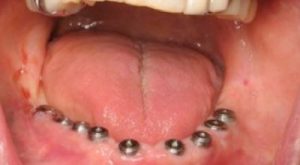
Full mouth implant requires the placement of 6 to 12 implant posts per arch
Final Teeth: Crowns & Bridges
Making permanent teeth for full mouth dental implants is quite a challenge. Your dentist has to establish your midline, smile line, teeth position, teeth size, color, etc. With no teeth to be used as a reference, your dentist needs to make everything from scratch that will resemble your original teeth. Your permanent teeth are made either from porcelain-fused-to-metal or zirconia. These are a combination of crowns and bridges that are fully supported by the implant posts. Full mouth dental implants offer realistic teeth that make you look like you just walked on the red carpet! Plus, the teeth offer you 100% chewing efficiency.
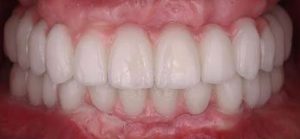
Full mouth dental implant teeth are made from porcelain-fused-to-metal or zirconia
What are some benefits of full mouth dental implant treatment?
Replacing all of your broken, infected, and missing teeth with dental implants is a life-changing experience. There are countless benefits to having fixed, permanent teeth as compared to removable dentures in your mouth. Here are some of the major benefits of full mouth dental implant treatment:
Fixed, Non-REmovable Teeth
Full mouth dental implants offer permanent teeth that are fixed in place. Your final teeth function just like natural teeth do. They won't rock back and forth when you're chewing on them. You won't get sore lesions and gum irritation as you did with dentures. Plus, your teeth do no cover your gum tissue like dentures do. You can eat whatever you want with full confidence and unparalleled comfort.

With full mouth dental implants you can chew whatever you like without hesitation
Highest-Quality Teeth
Your final teeth are made from high-quality, natural-looking porcelain-fused-to-metal or zirconia. These are both ceramics that closely resemble natural teeth. Porcelain and zirconia are extremely durable, sturdy, and long-lasting materials. It's nearly impossible to tell these teeth apart from your original teeth. The teeth don't change color or lose their chewing capability over time. Your beautiful new smile continues to remain beautiful over the many years to come. This is in huge stark contrast to dentures which have acrylic teeth that break easily, discolor, and wear out after a few years.
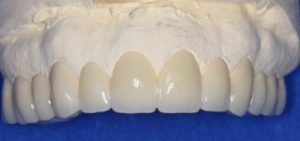
Porcelain and zirconia are much more durable than acrylic teeth
Full Chewing Ability
Denture teeth are not very efficient at cutting or crushing food. Many denture wearers struggle with hard food items. This is because dentures only offer between 20 to 40% chewing capability as compared to natural teeth. In contrast, full mouth dental implants offer the same chewing ability as natural teeth do. Therefore, you can eat whatever you want without having to think twice!
Preservation of Jawbone & Facial Muscles
Fixed teeth make you look and feel good. Dental implants protect your precious jawbone and facial muscles from atrophy (shrinkage due to misuse). The implant posts that are placed inside of your jawbone preserve the valuable jawbone structure. The fixed crowns and bridges maintain your facial muscles to prevent them from weakening and wrinkling. Unfortunately, dentures offer no such support for your jawbone or facial muscles. With dentures, your jawbone shrinks at an accelerated rate and your facial muscles collapse to make you look much older than you actually are!
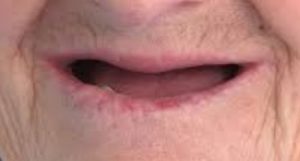
Dental implants preserve your jawbone and the fixed teeth prevent wrinkles on your face
Am I a candidate for full mouth dental implant treatment?
Full mouth dental implants are not for everyone. First off, not everyone qualifies for this treatment. You need to have sufficient jawbone to support multiple implants. If you have been without teeth for a long time, chances are you won't have enough jawbone. As a result, you will require extensive bone augmentation to prepare your jaws for implant placement. This typically involves complicated surgeries such as a lateral wall sinus grafts and/or autogenous block grafts. Not everyone wants to undergo these difficult surgeries. Luckily, you can bypass most of these complex surgeries and still receive a permanent set of teeth with all-on-four dental implants. All-on-four implant treatment uses just the anterior jawbone to secure your implants, therefore, bypassing the need for extensive bone augmentation. To learn more about all-on-four dental implants click here. Schedule a consultation with a dental implant specialist to discuss your different options and decide which option is best for your needs.
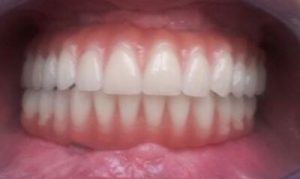
Most people require extensive bone augmentation surgeries prior to receiving full mouth dental implant treatment
How much does full mouth dental implant typically cost?
Full mouth dental implant is a complex and time-consuming process. Treatment typically involves multiple bone augmentation procedures, placement of numerous implants, and a complex crown and bridge restoration process. Your dentist will spend many months, sometimes years, restoring your missing teeth. In terms of costs, full mouth implants range between $20,000 to $50,000 per arch. This means that a case involving the top and bottom teeth could end up costing you between $40,000 to $100,000 or even more. This may seem like a very high price, but it's important to understand how much work is involved in full mouth dental implant treatment. There is no price for not having to suffer with dentures and struggling with what you eat on a daily basis. Full mouth dental implants is worth the price tag for patients who really need it and can find a way to afford their treatment.
Most dentists who offer these sorts of treatments offer financing options to help out their patients. If spending tens of thousands of dollars is simply not in your budget, then you should consider alternative treatment options. For example, all-on-four dental implants offer permanent teeth at a steep discount as compared to full mouth dental implants. Another option is to go for overdentures, which are dentures that are secured to a few dental implants. Note that this latter option is a removable one. While far less expensive, overdentures are really not comparable to full mouth dental implants in terms of functionality, comfort, or end results. In fact, many patients who choose to go for full mouth implants have previously had snap-on-dentures and were unsatisfied with the, before electing to upgrade to full mouth dental implants.
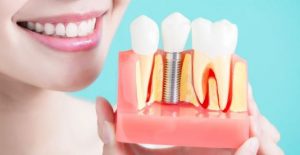
Full mouth dental implants typically cost about ten to twenty times what your dentist charges for a single dental implant!
